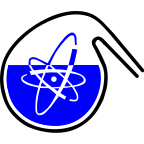Speaker
Description
Time-resolved laser-induced fluorescence spectroscopy is fast, easy and accurate optical method for low concentration determination and spectral characteristics of rare earth elements (e.g. Eu) and actinides (mainly U, Cm, Am) based on their luminescence properties.
Having Nd:YAG crystal as a laser source (emission wavelength 1064 nm) with the repetition frequency 10 Hz and Optical Parametric Oscillator (OPO) emitting laser beam ranging from 210-2400 nm it is possible to use UV and VIS light to excite the lanthanide and actinide ions in solutions.
For determining spectral characteristic of Eu(III) and U(VI) and their complexes, a 394 nm and 418 nm absorption wavelengths are used respectively. For Eu solutions, a complexing agent TODGA (N,N,N,N-tetraoctyl diglycolamide) as well as EDTA (especially its disodium salt), succinic, glycolic and phthalic acid with different metal-to-ligand ratio are used in an environment of pH ranging from 2 to 10. Solutions containing Uranium are acidified to pH 1 with commercially available Uraplex or phosphoric acid as complexing agents. Additionally, different matrices are used for concentration determinations and fluorescence lifetime measurements. For assessment of species of Europium and Uranium in different solutions a geochemical model PHREEQC is used.
Measurements are performed using quartz cuvettes with a 10 mm optical path at temperature 20°C in a thermostatted cuvette holder. The fluorescence spectra are recorded by grating monochromator in addition to ICCD camera.

